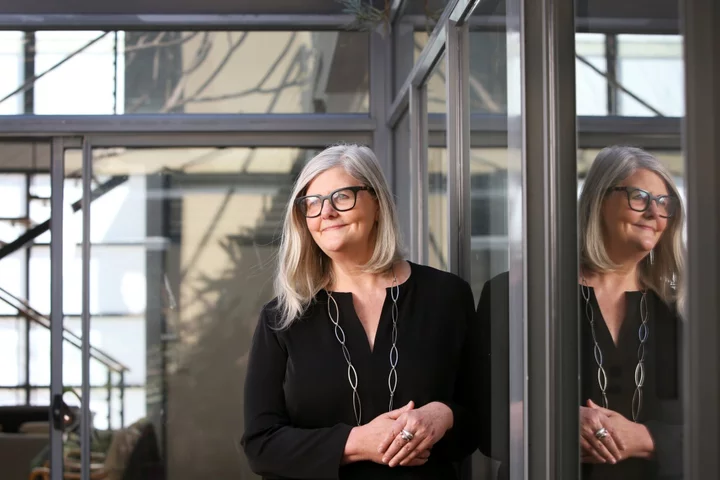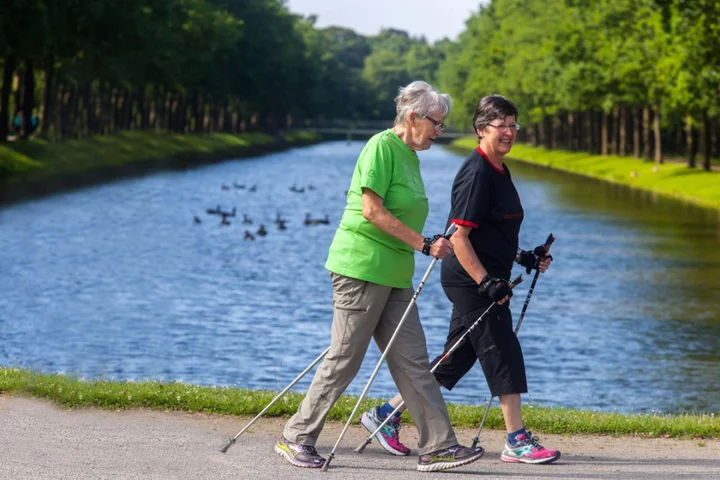
Naomi Osaka opens up about fighting thoughts that she ‘won’t be a good mom’
Naomi Osaka has reflected on battling self-doubt and difficult thoughts as a new mother. The four-time Grand Slam tennis champion gave birth to her first child, a daughter named Shai, in July 2023. She shares Shai with her partner, rapper Cordae. On Sunday (22 October), Osaka shared some insights into her personal life with her fans to mark turning 26 earlier in the week. In an extended post on X, formerly Twitter, the Japanese athlete wrote about taking stock of her life so far, and wondering whether or not she’s taken the “correct path”. “I often try to retrace my steps to figure out how did I end up here,” she explained. “I know I say this often but I truly still feel like that kid playing on public courts in Queens, NY. “Randomly I wonder if I’m doing OK, is there a correct path to take in life or have I veered off onto the scenic route for a little bit? However, I’ve now come into the mindset that I can only keep moving forward and everything that will be, will be.” Osaka then shared her specific feelings of worry about her capabilities as a parent. “Something I had to conquer recently is fighting the thought that I won’t be a good mom,” she wrote. “So many doubts raced through my head I had to swat them away like mosquitoes. “Looking into Shai’s eyes and holding her I always think, ‘Wow this little person depends on me so much, I have to do better.’ It’s such a strange feeling watching your kid grow, you blink and they’re double the size in a few months. “Gratefulness reminds me to breathe and take in the little things (and the big ones).” Osaka ended her post by expressing her gratitude for having “another year” and for the people who support her. Osaka’s last competitive match was at the Toray Pan Pacific Open in September 2022, before she withdrew from the tournament due to abdominal pain. She announced her pregnancy in January 2023 shortly after stating that she wouldn’t be competing in the Australian Open later that month. Last month, Osaka spoke about her year away from playing tennis and mentioned how other female tennis stars’ longevity has influenced her desire to keep competing. “The whole process, it felt long and short at the same time,” she told the American sports news channel ESPN. “When I stepped away, it was Tokyo, that was the last tournament I played. I just remember watching the Australian Open and being very devastated, because I’ve never missed an Australian Open. “When I was watching Serena and Venus [Williams], I was thinking, ‘Ah, I probably no way will ever play at their age’, but sitting here, I’m like, ‘You know what? I might do that actually.’” Read More ‘Truly heartbroken’ Rebecca Adlington reveals late miscarriage Should we stop putting the clocks back? What the experts think ‘I lost over a stone on Ozempic, but now it’s run out what am I to do?’ ‘Truly heartbroken’ Rebecca Adlington reveals late miscarriage Should we stop putting the clocks back? What the experts think ‘I lost over a stone on Ozempic, but now it’s run out what am I to do?’
2023-10-23 17:29

Rebecca Adlington says she’s ‘truly heartbroken’ after late miscarriage
Rebecca Adlington has said she’s “truly heartbroken” as the British swimmer announced she had a miscarriage at 20 weeks pregnant. Adlington, 34, said she went for her 20-week scan earlier this week and was informed her baby had no heartbeat, adding she and husband Andy Parsons, 31, “will forever love and remember” their daughter. She wrote on Instagram: “I don’t really have the words right now but unfortunately we went for our 20-week scan this week and they discovered no heart beat [sic].” Adlington added that she gave birth to the baby – who the couple named Harper – on Friday (20 October) and “we held her, and had time with her”. The two-time Olympic gold medallist thanked the staff at the Wythenshaw hospital in Manchester for their “incredible” kindness and care, and Parsons for his “selfless support, love, and help”. “I don’t have the strength or words right now and don’t feel ready to share this news,” Adlington continued. “However, I can’t pretend to be okay or fake a smile. I can’t have people ask me how pregnancy is or when I am due as I still look pregnant. I don’t have the strength to tell this news individually.” The former I’m a Celebrity contestant announced she was pregnant on 1 October, sharing a photograph of her family taken at Disneyland Paris. Former track athletes Dame Jessica Ennis-Hill and Greg Rutherford, ex-hockey player Sam Quek, former swim champion Adam Peaty, and presenters Angellica Bell and Helen Skelton shared messages of support in the comments section of Adlington’s Instagram post. Ennis-Hill wrote: “Oh Becky I’m sending you and your family so much love. I’m so sorry xxxx.” Rutherford said: “Sending love to you. So sorry to read this Becky xx.” Quek also wrote: “Becky, I know no words will ease the pain… my entire heart is with you all.” Peaty’s message read: “I’m so sorry to hear this, my prayers are with you all” alongside a heart and praying hand emoji. Adlington previously revealed she had a miscarriage 12 weeks into her pregnancy last August, sharing the news on Instagram at the time. The mother-of-two wrote: “It’s such a devastating time but important in times like these we remember we aren’t alone and have so much support. “Long way to go but I’m in the right place,” she added. “Once I’m able to leave hospital I’m extremely grateful I get to go home and give my 2 little ones the best hugs!” Adlington, who has also appeared on Celebrity MasterChef, shares one son, Albie, two, with Parsons. She also has an eight-year-old daughter, Summer, from her first marriage to swimmer and personal trainer Harry Needs. You can contact the Miscarriage Association helpline on 01924 200799 or email the charity at info@miscarriageassociation.org.uk. The helpline is open from 9am to 4pm Monday to Friday. For more information, help and support regarding pregnancy loss, you can contact Tommy’s on 0800 0147 800. To contact Petals to enquire about the charity’s counselling services, you can call 0300 688 0068 or email counselling@petalscharity.org. Read More Should we stop putting the clocks back? What the experts think ‘I lost over a stone on Ozempic, but now it’s run out what am I to do?’ Consistent lack of sleep may increase risk of future depressive symptoms – study Should we stop putting the clocks back? What the experts think ‘I lost over a stone on Ozempic, but now it’s run out what am I to do?’ Consistent lack of sleep may increase risk of future depressive symptoms – study
2023-10-23 15:22

Philips Lifts Outlook on Continued Supply-Chain Improvement
Royal Philips NV raised its full-year outlook after supply-chain constraints eased to give some breathing room to the
2023-10-23 13:47

Australia Gender Bias Costs Economy $80 Billion, Taskforce Says
Australia needs urgent legislative changes to end economic inequality between men and women, a government taskforce found, highlighting
2023-10-23 11:50

Kota: Stricter rules for India student hub after suicides
Young people from across India go to the city of Kota for tuition to help them pass entrance exams to elite colleges.
2023-10-23 09:17

When Japan Ends Negative Rate Policy, Treasuries Will Suffer
Japan’s era of negative interest rates will end in coming months, and the implications for world markets will
2023-10-23 08:56

The Northeast weekend weather curse is nearly two months old. Here's what's causing it and when it could end
Prepare for another dose of wet weekend weather in the Northeast, but this time, the dreary déjà vu comes with a twist -- some snowflakes may fly in high elevations.
2023-10-21 01:22

Will Poulter says acting offered ‘escape’ from mental health issues
Will Poulter has suggested his acting career meant he didn’t address his mental health “as early as I might have”. The 30-year-old British star has been acting since he was a child, first appearing in the 2007 film Son Of Rambow. “I think for me, performance offered me something of an escape,” Poulter told the PA news agency. “For a while, maybe I wasn’t addressing some of my mental health issues as early as I might have, because I was losing myself in my work a little bit, and that’s probably quite relatable to a lot of people, whether they’re actors or not. “So it’s been a kind of blessing and a curse in that respect, if I’m being completely honest, but I’m obviously very, very grateful to have found something that ultimately I’m very passionate about and I love doing, so it nets out as being a positive and I’m grateful for it.” Poulter, who has been diagnosed with generalised anxiety disorder, depression and OCD, has teamed up with Movember for its 20th anniversary to raise funds and awareness of testicular cancer, prostate cancer, mental health and suicide prevention. He said his experiences with mental health have “textured my experience in a number of different ways”, and highlighted the importance of opening up. “I’ve found, certainly, that having the opportunity to talk in a kind of no-holds-barred fashion, and not to feel the kind of brunt of the stigma, has been really beneficial,” the Maze Runner star said. “I think, to a large extent, a problem shared is a problem halved… By talking to people more openly about the subject of mental health, you quickly come into contact with the idea that it’s often people that you wouldn’t necessarily assume are suffering from something. “Everyone has a mental health to consider, everyone’s dealing with something to some extent.” There's still quite an asphyxiating stigma around mental health Will Poulter He said he’s been “liberated to talk about my mental health relatively freely”, but accepted that isn’t necessarily the case for everyone. “Certainly on a societal level, there’s still quite an asphyxiating stigma around mental health. I think what Movember have long done is helped deconstruct that stigma and create a more hospitable environment for people to be able to talk about mental health.” He suggested that mental health is “especially stigmatised” in the male community. According to the Office for National Statistics (ONS), around three-quarters (74%) of the suicides registered in England and Wales in 2021 were men. It’s the leading cause of death in men aged 20-34. Movember also said it’s believed one in five (20%) of men in the UK aged between 16-29 experienced moderate to severe depressive symptoms in 2023. The charity took on mental health and suicide prevention as a cause area in 2006, focusing on prevention, early intervention and health promotion focusing around men. Poulter, who is teaming up with Movember for the second year in a row, said he’s “very fortunate to have a lot of people in my life, both men and women, who contribute to that conversation [around mental health] very openly”, but accepted there’s still a way to go. “It often requires a lot of courage on behalf of the person who’s dealing with a mental health issue to speak up. What I think we have to work towards is a destigmatised society, so it isn’t such a courageous thing to do.” He continued: “When you break it down, ultimately we’re talking about an organ, or talking about taking care of your body. When you think about it like that, to think there’s so much stigmatisation around talking about taking care of the most vital organ in your body, it seems kind of bizarre – but that is the situation we find ourselves in.” Poulter said he always tries to “think about it in those terms”, and talk about it like that with “people in my own household and those nearest and dearest to me”. He added: “It’s always fascinated me that physical health, largely speaking, doesn’t have the same stigma surrounding it. People talk about physical health more freely than they do mental health.” Movember is an annual event where people grow moustaches during the month of November to raise awareness of a variety of men’s issues, and 2023 marks 20 years since the charity was founded in a pub in Melbourne, Australia, by two friends. Portrait photographer Rankin has teamed up with Movember to photograph people including Poulter, ex-Arsenal footballer Jermaine Pennant, TV presenters Laura Whitmore and Iain Stirling, and members of boyband Busted. Poulter is an ambassador of Movember, united to take on mental health, suicide, prostate and testicular cancers. See Movember.com. For mental health support, contact the Samaritans on 116 123, email them at jo@samaritans.org, or visit samaritans.org to find your nearest branch. Read More 5 of the hottest new perfume launches for autumn/winter Consistent lack of sleep may increase risk of future depressive symptoms – study World Osteoporosis Day: The risk factors and early warning signs everyone needs to know about How to support a child with a stammer From colourful gowns to drones, these wedding trends are set take over 2024 Call The Midwife ‘should come with a health warning’
2023-10-20 17:47

World Osteoporosis Day: The risk factors and early warning signs everyone needs to know about
October 20 marks World Osteoporosis Day – but despite being a relatively common condition, many people are unaware they’re at risk. According to Age UK, osteoporosis – which is associated with weakened bones and often referred to as a ‘silent disease’, as symptoms can creep up on people – affects approximately three million people in the UK. Yet, many only find out they have it when they break a bone. “[Osteoporosis] is a condition characterised by weakened bones, making them more prone to fractures,” explains Dr Zulqarnain Shah, a medical director at SSP Health. “It occurs when the body loses too much bone or makes too little bone, or both. Diagnosis of osteoporosis typically involves a combination of medical history, physical examination, and specialised tests, such as bone mineral density scans,” Shah adds. Could I be at risk of osteoporosis? According to Age UK, around half of women over 50, and around one in nine men in the same age group, will experience a fracture due to osteoporosis. However, several risk factors contribute to the development of the condition, meaning some people may be more likely to get it. “These include menopause, low calcium and vitamin D intake during younger years, family history, a sedentary lifestyle, smoking, excessive alcohol consumption, and certain medications,” explains Shah. “While it may not be possible to prevent all cases of osteoporosis, adopting a healthy lifestyle with regular weight-bearing exercise, a balanced diet rich in calcium and vitamin D, and avoiding smoking and excessive alcohol intake can help reduce the risk.” Being aware of osteoporosis can be particularly important if you have a family history. “A family history of osteoporosis or fragility fractures can indicate an increased risk,” explains Dr Elise Dallas, GP at The London General Practice. Other things that increase risk include having a history of “rheumatoid arthritis, low levels of oestrogen due to early menopause, anorexia nervosa or Turner’s syndrome, hyperthyroidism, parathyroid disease, Crohn’s and coeliac disease, and conditions that cause long periods of immobility”, adds Dallas. What are the symptoms of osteoporosis? When you have osteoporosis, you may suffer from “increased fracture risk, height loss, and chronic pain”, says Shah. “Fractures associated with osteoporosis are known as ‘fragility fractures’, which can occur with minimal impact. Fractures commonly occur in the spine, hip, and wrist, and can lead to significant pain, disability, and reduced quality of life,” he explains. Are there any early warning signs? Shah says: “Early signs of osteoporosis may not be apparent until a fracture occurs. However, a precursor condition called osteopenia may be detected through scans before the onset of full-blown osteoporosis.” Osteopenia is where the density of the bones decreases, but not thoroughly enough to be classed as osteoporosis. There are no real symptoms however, so it can only be detected with scans. The good news is, lifestyle measures and sometimes treatment can help prevent it getting worse. How is osteoporosis treated? Treatment for osteoporosis is mostly aimed at “strengthening bones and preventing fractures”, says Shah. “This typically involves a combination of lifestyle modifications, such as exercise and dietary changes, along with medication. “Medications may include calcium, vitamin D and bisphosphonates, hormone therapy for postmenopausal women, selective oestrogen receptor modulators (SERMs), and other options. “SERMS help manage the way oestrogen interacts with your body and has a similar impact on osteoporosis as hormone replacement therapy, to help mitigate the impacts of hormones on osteoporosis,” Shah explains. “Regular monitoring and adherence to treatment plans can help slow down or stop the progression of osteoporosis. A bone density scan – also known as a DEXA scan – can help monitor the progress of a condition and may be done at three to five-year intervals to assess progress. “Once a patient has been on bisphosphonates for five years, they may go on a ‘pill holiday’ for a couple of years, though the benefits of taking bisphosphonates continue long after the medication is stopped.” Getting support and advice to manage any pain and mobility challenges and reduce the risk of falls and injuries can also be very important for people living with osteoporosis, along with finding ways to stay active. If you are worried about your bones and osteoporosis risk you can reach out to charities like the Royal Osteoporosis Society and find out about your risk level. Read More How to support a child with a stammer From colourful gowns to drones, these wedding trends are set take over 2024 Call The Midwife ‘should come with a health warning’ Halloween: 10 wicked ways to kit out your haunted house Black magic: Go back to black this season with the catwalk-inspired trend How to prep your home for when the clocks go back
2023-10-20 15:25

How to support a child with a stammer
For people with a stammer, it can be hard to deal with, but it’s made worse by the fact that understanding of the condition amongst the general public is low. The speech problem usually starts in childhood, between the ages of around two and five years old, affecting around 8% of children and 2% of adults – that’s more than 1.3 million people in the UK. International Stammering Awareness Day (October 22) aims to destigmatise stammering and promote understanding and support for people who do have it, including advice for parents about how they can help affected children. “There’s a lot of stigma around stammering in society – even from an early age, children may be teased or bullied, and adults may tell them to speak properly,” says Catherine Woolley, children and families programme lead at STAMMA (the British Stammering Association). “Children who stammer sometimes feel embarrassed or worried about their speech and try to hide it. They might start to speak less or change words they want to say to ones which are easier to produce. “How you respond to your child can affect how they feel about their talking. It’s common for parents to worry about stammering, and if this is you, you can seek support to help you feel comfortable around your child’s stammering.” Woolley points out that, contrary to popular belief, stammering isn’t caused by anxiety or stress, and there’s no evidence that people who stammer are less intelligent than fluent speakers. “Research suggests stammering is neurological, which means there are subtle differences in the way the brains of people who stammer work,” she explains. “This means it belongs to the same group of neurodiverse conditions as ADHD, autism and dyslexia.” The condition is often hereditary, with about 60% of people who stammer having another family member who stammers, and while there’s no specific cure, Woolley says there are many different techniques and approaches that can increase people’s fluency in certain situations, although they may not work for everyone. “There isn’t one treatment which can miraculously make all people stop stammering,” she stresses. “Everyone’s stammer is unique, as is the way they want to manage their speech.” But there’s no doubt, she says, that parents can help their children deal with stammering, and make them feel more comfortable. 1. Value your child’s stammered voice “It’s simply the way they talk,” says Woolley. “What’s important is what they say and not the way they say it.” 2. Be patient Although it can obviously take more time for a child who stammers to say something, it’s important for parents and the rest of the family not to rush them. “Give them time to say what they want, and model this to their siblings and other family members,” she adds. 3. Don’t finish their words or sentences Woolley says that while it can be tempting to finish your child’s words or sentences for them, especially if you can see them struggling, it’s important to resist this urge to help. “It can be disempowering and embarrassing if you speak over them,” explains Woolley, “not to mention frustrating if your guess is wrong and they have to start all over again.” 4, Slow down yourself Rather than telling your child to speed up, slow down your own speech to reduce any time pressure they may feel. 5. Don’t show your own anxietyEven if you feel anxious when your child is stammering, try not to show it, advises Woolley, who suggests maintaining natural eye contact and remaining calm. “It can be uncomfortable listening to someone who stammers, but think how they feel. Try and maintain eye contact even if you feel awkward, as looking away can make them feel awkward too, or think you’ve lost interest in what they’re saying. Keep looking at them and give the occasional encouraging head nod to show you’re interested.” 6. Try not to be negative Woolley says it can be important to describe stammering using neutral language instead of negative references. So, for example, say, ‘He’s stammered more this week’, rather than, ‘His speech has been bad’. 7. Seek help Parents who are worried about their child’s talking or would like some help should contact their local NHS speech and language therapy department to talk through their concerns. In addition, STAMMA offers free Parent2Parent peer support groups run by parents of children who stammer, and workshops for such parents, plus a helpline (0808 802 0002) and a webchat service. Read More From colourful gowns to drones, these wedding trends are set take over 2024 Call The Midwife ‘should come with a health warning’ Halloween: 10 wicked ways to kit out your haunted house Black magic: Go back to black this season with the catwalk-inspired trend How to prep your home for when the clocks go back Menopause campaigner Mariella Frostrup: ‘I look forward to a future where women gradually stop feeling so ashamed’
2023-10-20 14:56

Hitting snooze button can actually benefit brain sometimes, study suggests
Hitting the snooze button on the alarm clock once in a while might actually support the brain’s process of waking from deep sleep, according to a new study. People sometimes want to go right back to sleep even after the alarm goes off in the morning, using the snooze button in clocks and cell phones. Decades of previous research suggested that hitting snooze can have negative effects, both on sleep and the brain’s ability to wake up, but until now there hasn’t been any direct evidence of this, say scientists. The new study, published in the Journal of Sleep Research, assessed how common snoozing is and what effects this behaviour has on sleep, sleepiness, mood, and the brain’s cognitive abilities. Researchers found that those who snooze on an average sleep slightly shorter and feel more drowsy in the morning compared to those who never snooze. But they also saw that there were no negative effects of snoozing on the release of the stress hormone cortisol, mood, or sleep quality throughout the night. In the study, 1732 individuals answered questions about their morning habits, including how often they hit the snooze button with many – especially young adults – reporting that they use the alarm feature regularly. The most common reason for snoozing, according to participants, is feeling too tired to get out of bed when the alarm goes off. In another small follow-up experiment, 31 regular snoozers spent two nights in a sleep lab in order to measure their sleep in more detail. On one of the mornings, they were allowed to snooze for 30 minutes, and on the other, they had to get up right when the alarm went off. While in the first case, participants’ sleep was disturbed during the half hour of snoozing, most of them still got more than 20 minutes of sleep – meaning that their total night’s sleep was not affected much. In the snooze condition, no one had to wake up suddenly from deep sleep, and the snoozers performed a bit better on cognitive tests right upon waking. There were also no clear effects of snoozing on mood, sleepiness, or the amount of cortisol in the saliva. The results hint that half an hour of snoozing may not have negative effects on night sleep and could have some positive effects like a decreased likelihood of waking from deep sleep. However, researchers caution that the second experiment was small and only included people who are regular snoozers who find it easy to go back to sleep after each alarm. They say snoozing is most likely not for everyone. Jennifer Kanaan from the University of Connecticut in the US, who is another sleep scientist unrelated to the study, said the latest findings should be interpreted with caution as it could send the wrong message to people. “If you’re coming in and out of sleep for 30 minutes, after the alarm goes off the first time, you’re costing yourself 30 minutes of uninterrupted, quality, restorative sleep,” Dr Kanaan said in a statement. Instead of trying to figure out how to manipulate our alarm clocks, she says people should make a consistent good night’s sleep a greater priority and be less reliant on snooze buttons. “Simply put, instead of hitting the snooze button they should get more sleep,” Dr Kanaan said. Read More Study reveals why millions of women wake up at 3.29am Consistent lack of sleep may increase risk of future depressive symptoms – study Breakthrough study allows scientists to communicate with people as they sleep How to support a child with a stammer ‘I lost nearly a stone on Ozempic, but now it’s run out what am I to do?’ Miriam Margolyes now has part of a cow’s heart as she opens up about health
2023-10-20 14:52

Travis King: Soldier who fled to North Korea 'charged back in US'
Charges against Travis King reportedly include desertion and possessing sexual images of a child.
2023-10-20 14:51
